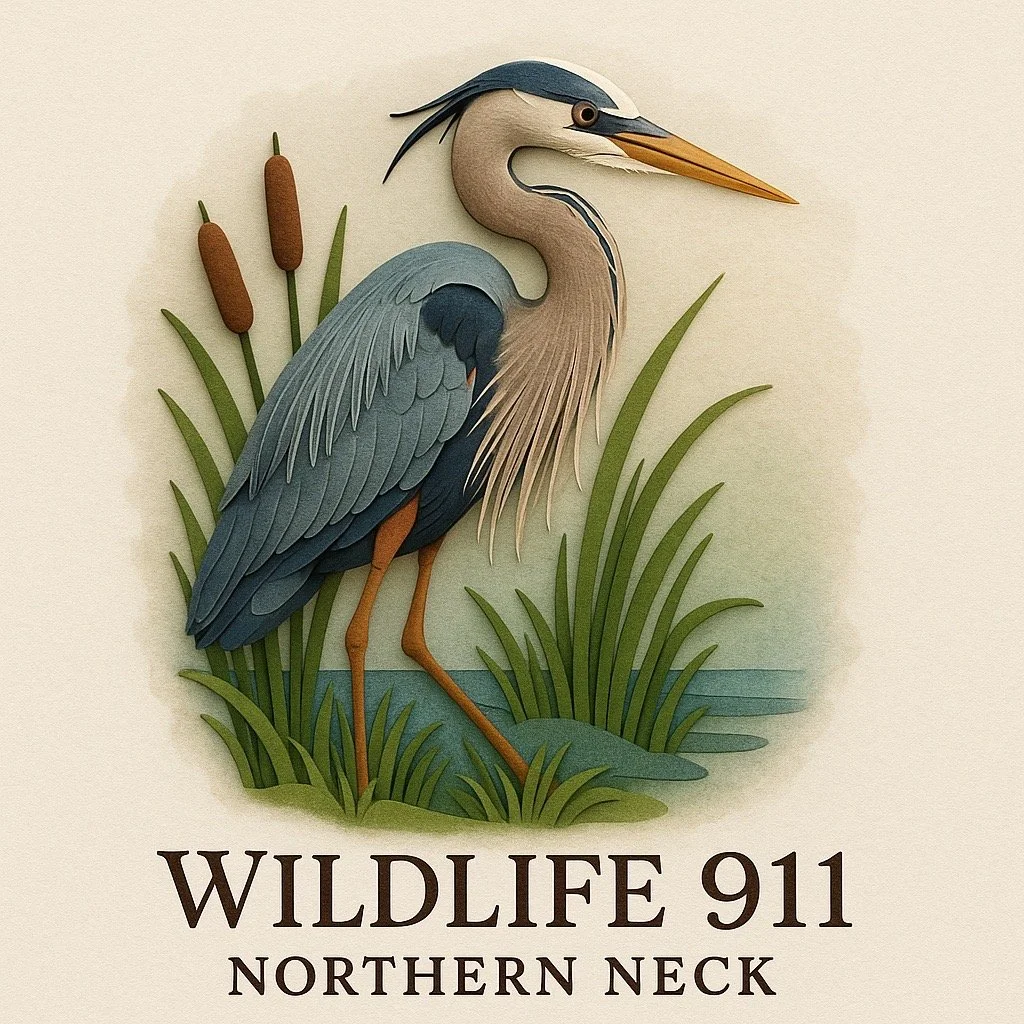Good Samaritan FAQ
-
Minimize contact.
If safe, place the animal in a ventilated cardboard box lined with a towel, keep it warm, dark, and quiet
Do not feed or give water.
Call Wildlife 911 at (804) 453-0050
-
Q: Is it legal for me to pick up injured/orphaned wildlife?
A: Yes—only to take it directly and without unnecessary delay to a permitted rehabilitator, a DWR (state) employee, or another person authorized by DWR—and only after you contact them to confirm they can accept the animal. No care may be provided before transport unless directed by a rehabilitator or DWR employee.Q: Can I transport wildlife to my local animal shelter?
A: In many cases yes, after you call the shelter to confirm they can accept it. (Note that certain species—e.g., threatened/endangered species, migratory birds, black bear, white-tailed deer, wild turkey—have special restrictions for shelters.)Q: Can I keep or “try to rehab” the animal myself?
A: No. Possessing or keeping wild animals without proper permits is unlawful in Virginia. Virginia LawQ: Can I relocate wildlife I’ve trapped or found?
A: No. Trapping and relocating wildlife to another area is illegal in Virginia. Wildlife Resources VirginiaQ: Is it okay to feed wildlife (including “helping” an injured animal)?
A: No. Don’t feed or give fluids unless a rehabilitator tells you to. Virginia also prohibits feeding that attracts wildlife in a way that creates hazards. -
Q: Which animals should I not attempt to capture or handle?
A: Avoid rabies high-risk species and any adult sick or injured mammal: bats, raccoons, skunks, foxes, and woodchucks (groundhogs). Call the Wildlife 911 at (804) 453-0050, animal control, or a conservation police officer instead. Wildlife Resources Virginia+1Q: I found a fawn or baby rabbit alone—should I “rescue” it?
A: Usually leave it. Parents are often nearby. If you already picked it up and it wasn’t truly orphaned, you can often return it to the exact spot the same day and watch from a distance; if the parent doesn’t return by dusk, contact Wildlife 911 at (804) 453-0050.Q: What about adult deer, bear, or coyotes?
A: Do not handle. Virginia rehabilitators may not treat adult deer or coyotes; contact animal control, sheriff’s office, or DWR for these cases. Wildlife Resources Virginia+1Q: I found a bird (including hawks/owls) that’s injured. What can I do?
A: Under federal rules, you may take possession only to immediately transport a migratory bird to a federally permitted rehabilitator or licensed veterinarian. Call first to confirm acceptance, contain the bird safely, keep it dark/quiet, and do not feed or water. eCFRQ: Can I keep feathers, nests, or eggs I find?
A: No (for most native birds). The federal Migratory Bird Treaty Act prohibits possession of feathers, nests, and eggs without authorization. U.S. Fish and Wildlife ServiceQ: There’s a turtle in the road—can I help?
A: Yes: if it’s safe, move the turtle to the side of the road in the direction it was traveling. Do not relocate it to a new area or keep it as a pet. For injured turtles, contact (804) 453-0050. -
Q: How should I contain and transport a small animal I’m allowed to help?
A: Use thick gloves, place the animal in a ventilated cardboard box with a towel, keep warm/dark/quiet, and limit handling. Do not feed or give fluids unless instructed. Contact Wildlife 911 at (804) 453-0050.Q: It’s after hours—can I keep the animal overnight?
A: Virginia allows a Good Samaritan to capture and transport directly to an authorized person without unnecessary delay—so call a rehabilitator right away for instructions. If you must hold it temporarily until you can transport, follow the box/quiet/warm guidance and avoid feeding or other treatment unless directed. Legal Information Institute -
Q: What if I’m bitten or scratched?
A:Immediately wash with soap and water for 10–15 minutes and report it to your local health department or animal control. Bats, raccoons, skunks, foxes, and woodchucks are high-risk for rabies in Virginia. Follow health department guidance about testing and exposure management. Virginia Department of Health+1Q: A bat was in my house—what should I do?
A: Avoid direct contact; if someone was sleeping in the room or contact can’t be ruled out, treat it as a potential exposure and contact your health department immediately for next steps (which may include safely capturing the bat for testing). Virginia Department of Health -
Virginia Admin Code expressly limits public possession of wildlife and sets the Good Samaritan pathway for capture and direct transport after contacting the receiving facility; it also says no care before transport unless directed. Legal Information Institute
Rehab permit conditions restrict certain species (e.g., adult deer, coyotes), so citizens should defer to animal control/DWR for those. Wildlife Resources Virginia
Federal law lets you only transport migratory birds immediately to a permitted rehabilitator or vet—no home care. eCFR



